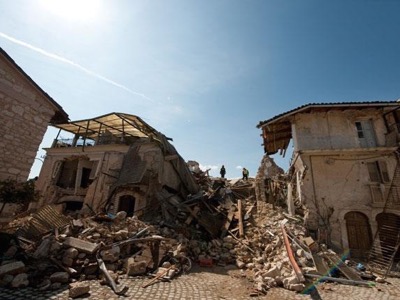Manlio Dinucci takes another look at the impropriety of Italy’s display of solidarity with the victims of the earthquake that has just struck the heart of Italy. Why improper? Because it sends out the message that Italy has complete contempt for the victims of the wars that it, in collusion with Nato, is secretly engaged in.

“Only rubble, as if there had been a bombing”, exclaimed Boldrini the President of the House of Representatives, visiting the places hit by the earthquake. Words which require reflecting beyond the images.
Before the agonizing scenes of children who had died under the rubble brought about by the earthquake, how can we not think about those children (that TV has never shown us) dead under the devastation resulting from bombings spanning Yugoslavia through to Libya – bombings in which Italy also participated? “It seems that we are at war,” recounts one of the throngs volunteers.
But in actual fact, Italy is already embroiled in a war, a live war, where it is burning vital resources that should be allocated to protect our country’s people from landslides and floods that always cause more victims and devastation. In an outburst of generosity, politicians from different regions have proposed to allocate the Superenalotto jackpot (130 million euro) to the areas hit by the earthquake. However not a soul has proposed allocating the “jackpot” of Italian military expenditure for this objective. According to official Nato figures, this amounts to around 20 billion euro in 2016 (a 2.3 billion increase compared to 2015), an average of 55 million euro per day. In actual fact, this figure is far higher when the out-of-budget expenditure for defence, charged to the High Ministers is taken into account. However going by Nato data, Italy’s military expenditure in one day alone is greater than what the government has allocated for the earthquake emergency (50 million euro), five times more than what has been collected to date with supportive SMSs.
While there are no funds for reconstruction and for making buildings safe with real anti-seismic systems, nor a long-term plan to respond to earthquakes and hydrological instability.
While the fire-fighters, whose merits on these occasions are formally recognized, they have staff, salary and resources wholly inadequate for the work they are undertaking, often, putting their lives at risk, not only in everyday emergencies, but those increasingly frequent “natural” disasters (the catastrophic consequences of which are, for the most part, attributable to humans).
On the other hand, there is no shortage of funds and resources for Italian Special Forces that operate in the new war in Libya. At Pisa, where two years ago, a Command for Special Forces of the Army (Comfose) was established, the number of C-130J flights leaving for unknown destinations loaded with arms and resupplies has been increasing for some months now. Such operations are secretly authorized by President Renzi, bypassing Parliament. Art 7 bis of Law n. 198/2015 on extending military missions abroad confers on the President of the Council the power to adopt “smart measures to contain, in crisis situations, with the cooperation of the Special Forces of Defence with subsequent arrangements to support the Defense itself”, with the sole obligation to refer them formally to the “Parliamentary Committee for the Security of the Republic”. In other words, the President of the Council is free to use the Special Forces and Intelligence Services in secret operations, with the support of the entire military. A personal power, that is not constitutional and that is also potentially dangerous at the domestic level.
So while the President of the Council, Renzi displays deep emotion at the funeral of the victims of the earthquake and gives lavish promises on reconstruction, he is taking Italy into more wars in the context of the US/NATO strategy and increasing military expenditure at the cost of the country’s essential needs. A cost on top of which is the secret cost of secret military operations that he ordered. While on the promised reconstruction of the areas affected by the earthquake, Renzi guarantees “maximum transparency”.

 Articles by this author
Articles by this author Send a message
Send a message

















Stay In Touch
Follow us on social networks
Subscribe to weekly newsletter